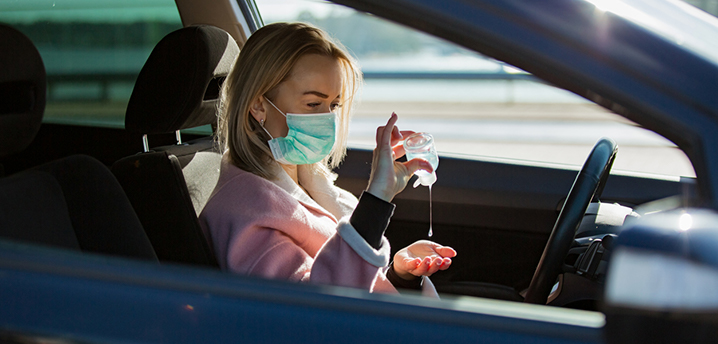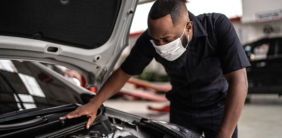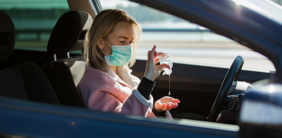Properly disinfecting your car is an important part of limiting the spread of viruses, like coronavirus.
Due to the recent spread of the novel coronavirus, life for millions around the world looks very different today than it did just a few short weeks ago. Many of us are suddenly practicing social distancing, frequent handwashing, and even sheltering-in-place in an effort to limit the spread of this disease.
Whether you are driving your vehicle only to get necessities or still commuting to work each day, though, learning how to adequately disinfect your car is key to limiting viral exposure.
Keep Your Car from Being a Germ-Mobile
According to the AAA Foundation for Traffic Safety, Americans spend an average of nearly 300 hours in their cars each year. That makes it easy to see how our vehicles can quickly become germ factories on wheels, picking up and even transmitting the bacteria and viruses that we encounter daily.
Between door handles, gear shifters, steering wheels, and even volume knobs, there are plenty of opportunities for cross-contamination in our cars. While it’s wise to mitigate the spread of these germs all year long, it’s especially important during flu season… or in the midst of pandemics such as COVID-19.
Your car and coronavirus
Many of us have been homebound for weeks due to school and business shutdowns, or even shelter-in-place orders. For those whose jobs are considered essential, though, heading to work is still part of the daily routine.
If you’re still commuting to and from work, you are picking up germs everywhere you go. Like your cell phone, bag, and even your shoes, your car is being exposed to all of the nasty microscopic bugs you pick up throughout the day. Every time you get in your car, you increase the chances of spreading those same germs to others, even if you’re doing things like practicing frequent handwashing.
With viruses like coronavirus able to live on plastic surfaces (e.g., your vinyl dashboard or steering wheel) for up to 72 hours, it’s important to consider the role your car may play in transmitting germs. That way, you can take steps to both limit and eliminate the risk, no matter how infrequently you get behind the wheel.
What If You’re Not Commuting?
This is a great time to give your vehicle a disinfecting deep-clean, even if you aren’t commuting to work.
You may still be using your car on occasion for essential errands, like market runs or meal pickups. However infrequent, these trips still increase your chances for germ accumulation — especially if your outings include the grocery store, where you’ll touch everything from cart handles to dirty debit cards or cash.
The dirtier the surfaces on your vehicle, the easier it is for things like viruses and bacteria to live on them. That’s because dust and oils give germs a great place to stick around. By cleaning your car thoroughly (and making it a regular practice), you’ll limit everyone’s exposure to these bugs… even if you aren’t driving very much right now.
Limit COVID-19 Cross-Contamination
Picking up germs throughout the day is inevitable. However, there are a few things you can do to limit the number of microscopic freeloaders you bring with you into your vehicle.
Switch out shoes
According to a study from the University of Arizona, the sole of your shoes may be home to over 421,000 different pathogens, including viruses and bacteria. That same study found that the transfer rate of those pathogens from your shoes to other surfaces — such as the tile in your home or perhaps even the floorboards of your car — is over 90%.
Rather than bring those microscopic bugs into your vehicle, and ultimately home with you, limit cross-contamination by switching out your shoes. Keep a pair of clean slip-ons that are only meant for driving, and put your work shoes in a plastic bag before getting into the car.
Keep a change of clothes handy
While viruses, including COVID-19 virus, don’t tend to transmit very well on soft fabrics, it might give you added peace of mind to change clothes before getting into your car. This can help limit the contamination of your car’s interior, especially if you are forced to be in close proximity of others throughout the day.
Use hand sanitizer or disinfecting wipes
Ideally, you should be washing your hands frequently throughout the day and before you head home from work or the grocery store. When getting into your car, though, you may also want to use a hand sanitizer or disinfecting wipe to keep from contaminating surfaces like your steering wheel, seatbelt, door handles, and the like.
Put your bag in the trunk
You drop it on the floor, set it on tables, and touch it with your hands. Rather than put your bag on the seat next to you when you get in the car, though, consider putting it in the trunk. This will further help to reduce the contamination of your car.
Time for a Good Cleaning
For many of us, keeping our cars clean is a matter of appearances and tidiness more than anything. We may run through the car wash on our lunch breaks and clean out the clutter every few days, but how often do we really get in there for a deep clean?
According to a recent Expedia study, one-third of drivers say that they only clean the interior of their cars once a year. Additionally, 12% of driver respondents said that they never clean the inside of their vehicle.
Because pathogens like viruses and bacteria thrive in grime — the various oils, skin cells, and dust that accumulate on surfaces — a dirty car could easily turn into a breeding ground for germs. For that reason, the best place to start is often with a simple deep clean.
Wipe down surfaces
By giving the interior of your car a thorough wipe-down, you can make a world of a difference when it comes to disinfecting.
You might be surprised to learn that warm, soapy water is often all that’s needed to drastically reduce the spread of germs, whether we are talking about your hands or your vehicle. It doesn’t need to be an antibacterial cleaning product, either — plain old soap is enough to break up the grime and destroy many pathogens.
Prepare a small bucket of hot, soapy water to wipe down the metal and plastic surfaces of your vehicle. This may include your door handles, dashboard, steering wheel, locks, cup holders, and gear shifter. Just be careful to avoid getting water near any electronic components!
Cleaning upholstery
Between upholstery seats and your vehicle’s carpet, you’ll want to pay some attention to the various fabrics in your car. A good vacuuming will go far in helping to reduce dirt, especially if your vacuum has a HEPA filter.
The EPA states that you should ideally use products designed to clean each specific material in your car when trying to eliminate viruses like the flu or coronavirus. Your everyday carpet shampoos and car upholstery cleaners are enough to reduce dirt and grime… no need to go looking for specialty products.
Be careful with things like hydrogen peroxide or bleach, however, as they can permanently discolor your fabrics.
How to clean car leather seats
Depending on the type of leather in your vehicle, you may need to approach the disinfecting process differently.
While sanitizing wipes can kill germs, they may also dry out your leather and/or strip the color. Instead, you might want to opt for a gentle, soapy water solution or even a leather-specific cleaner that is designed to break up oils. Both of these will go a long way in reducing germs that may be hiding in your car.
Be sure to adequately clean seats, headrests, and armrests. After cleaning, use a microfiber cloth to apply a leather conditioner, which will help keep your seats from drying out and cracking.
How to Disinfect a Car
If you’re only using your car to hit up the grocery store or grab dinner for the family, a thorough car cleaning may feel sufficient. However, if you are an essential employee in close contact with the public— such as delivering food or working at a grocery store — you may want to go a bit further in disinfecting your car.
Don’t damage your interior!
While there are many products named by the CDC to kill the COVID-19 virus, it’s important that you don’t damage your car with whichever you use.
Hand sanitizers, sanitizing sprays, and disinfectant wipes often contain alcohol and/or bleach. Depending on which products you’re using, the materials that are in your car, and how often you plan to disinfect, you can permanently damage your interior if you’re not careful.
See if your vehicle manufacturer has any specific recommendations for cleaning the interior before you start. It’s also wise to test out an inconspicuous spot first to check for discoloration before you treat a large area.
Use wipes
Disinfecting wipes are a good option for cleaning car stereos, touchscreens, seat controls, and steering wheel buttons. They’re usually a safer choice, too, since electronic components and hot, soapy water don’t tend to mix well.
According to Lysol, their disinfecting wipes are bleach-free and therefore safe to use on electronics (including those in your car’s interior), while still killing 99.9% of viruses.
Consider high-tech options
I recently had my vehicle detailed by a company that uses low-humidity, high-temperature steam in their cleaning process. The result was an incredibly clean car that smelled fresh and was sanitized by default.
“The steam reaches a temperature of 270 degrees, which kills 99.6% of viruses and bacteria,” says Marija of Fairfax Mobile Steam Car Detailing. “This new-generation steam technology is used to disinfect hospitals and emergency vehicles around the world — the best way to stop the spread of coronavirus in your car is to use these high-temperature pressure cleaning techniques.”
If you are constantly being exposed to potential pathogens, hiring a company to disinfect your car safely — with a process like steam or ozone — may be well worth the cost!
Final Thoughts
It’s always wise to take measures to prevent the spread of illness as best you can, each and every year. With the recent impacts of COVID-19 on the world, however, these efforts have suddenly become imperative for everyone.
If you’re an essential employee who cannot stay home during this time, limiting your exposure to pathogens can be difficult. By taking steps to adequately disinfect your car, you will not only reduce your own exposure to these germs, but also lower your chances of passing them on to someone else.
About The Author
RateGenius
A better way to refinance your auto loan. RateGenius works with 150+ lenders nationwide to help you save money on your car payments. Since 1999, we've helped customers find the most competitive interest rate to refinance their loans on cars, trucks, and SUVs. www.rategenius.com
;)





